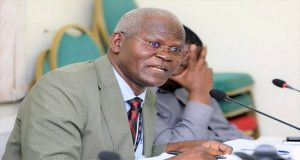
The Kampala Capital City Authority (KCCA) Executive Director Dorothy Kisaka has come out to clarify on the alleged inflated cost of its ongoing Roads Rehabilitation Project (KCRRP) road works.
Funded by the African Development Bank (AfDB), the project costing $288m will see a total of at least 30 roads across the city rehabilitated.
As we count down to the launch of the construction works of these roads in February, there has been allegation that the cost of the road works has been inflated with each kilometer estimated at UGX 14billion.
However, this unfound allegation has been dismissed by Kisaka who said those trading it are misleading the people of Kampala. Kisaka gave a thorough explanation while addressing the media at her office on Monday.
“KCCA has no intention of misusing government funds. We have gone through a clear process and involved all stakeholders, including the Parliament, the AfDB, and the Ministry of Finance regarding the cost,” Kisaka said.
Before reaching the UGX 14bn per kilometer claim, those alleging this cost used a wrong formula of dividing the amount available ($288m) by the number of kilometers (69.7km) without considering other aspects of the road works.
According to Kisaka, the project works include the reconstruction of at least 100km of roads, 123km of walkways, construction of 30 public toilets and covered drainage.
The project will also include upgrading of 22 junctions, construction of six roadside markets and training youth and women groups and parking areas for commercial vehicles.
The project also includes construction of parking areas for commercial vehicles, installation of 1,600 street lights and landscaping works.
“Roads can be of varied costs. With increasing number of vehicles, we have to make quality strong roads. We are building roads to last 15-20 years,” Kisaka said
Initially the project was designed to cover 69.7kilometers of roads and procurement of eco-buses.
However, following the advice of President Museveni the purchase of echo-buses was scrapped and the money dedicated to construction of more roads.
“This saving will see us construct more 16km of roads, whereby roads like Kitezi are going to benefit. The dual carriage of some roads like Old Portbell road will increase the construction works by 14km. This brings the whole total of kilometers to be reconstructed to 100km,” Kisaka said
Other aspects of the project include tree planting, provision of the road maintenance services, among others.
The KCRRP was conceptualized in 2016 and the funding approved by the Parliament in 2020.
“The costing was not done by KCCA. These are not single boardroom decisions of officers sitted in KCCA offices but by various stakeholders and all stages including Parliament considered this cost. In May 2021 Parliament approved this funding and the costing of the project,” Kisaka said.
The project is in line with the National Resistance Movement (NRM) Manifesto which promised to deliver 100 kilometers in the city in the manifesto.
“We are on track to deliver this manifesto promise. Come February we shall start this project and the President is expected to come and launch these roads,” Kisaka said.
She commended the political leaders who have provided oversight to the project since the inception of the same in 2016.
Regarding potholes, Kisaka revealed that KCCA has embarked on citywide fixing of potholes as they look for more funds to rehabilitate these roads.
“We identified 8,000 square kilometers of potholes that need refilling. We are not using money for reconstruction to maintain these roads,” Kisaka said.
In the budget KCCA received UGX 26bn for the annual road maintenance which is different from the money for road reconstruction.
Some of the roads where potholes have been fixed include; Katwe Road, Katalina road, Kiteezi, Konge Lane, and Nasser road among others.
She however decried the huge funding gap that is affecting infrastructure development in the city.
“The state of roads in Kampala is poor. Majority of the tarmac roads are old and need to be rehabilitated. We have 2100km of roads, but only 600km are tarmac, the rest are marrum roads. We need some substantial amount to improve them,” Kisaka said.
She revealed that focusing on infrastructure is very important in delivering the aspirations of a smart city.
Source: KCCA Website.






